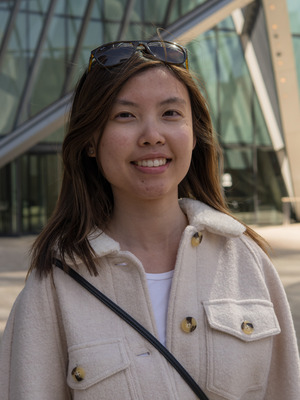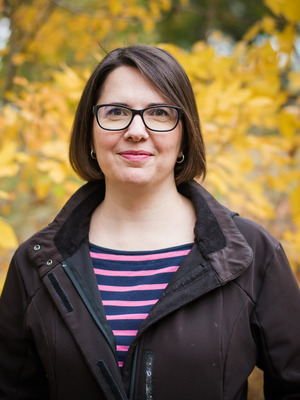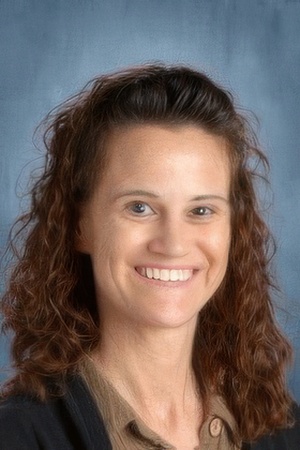Women studying sciences at Athabasca University share their perspectives on International Women’s Day
Despite decades of work and progress, women are still underrepresented in careers and educational programs related to science, technology, engineering, and math (STEM).
According to Statistics Canada, women in Canada are 30% less likely to enrol in a post-secondary STEM program shortly after graduation, and just 30% of Canadians currently employed in a professional STEM field are women.
Athabasca University’s Faculty of Science and Technology is helping to improve those figures, with programs that promote access, opportunity, and community that empower all students, regardless of gender, to make their highest contribution.
For International Women’s Day, we asked four inspiring AU students in STEM programs to share what motivates them and how they overcome challenges working and studying in male-dominated fields.
Karen Lam
Bachelor of Science, Computing and Information Systems
 Karen Lam says she feels lucky that so many people in her life have encouraged her to pursue education in STEM fields. High school teachers supported her with research projects, professors at the University of Calgary encouraged her while she earned a biology degree, and many bosses and managers have encouraged her to pursue further education.
Karen Lam says she feels lucky that so many people in her life have encouraged her to pursue education in STEM fields. High school teachers supported her with research projects, professors at the University of Calgary encouraged her while she earned a biology degree, and many bosses and managers have encouraged her to pursue further education.
But even with so much encouragement, she always felt some degree of societal and family pressure to choose a more traditional route.
“The pressure to settle down, find a partner, and start a family was something I battled and continue to navigate,” she said.
Lam said she has never felt that being a woman has had a negative impact on her experience at AU, where she has been able to study for a new degree while also balancing a full-time workload as an IT professional in a health-care setting.
“I’ve always been treated equally, and I truly appreciate the inclusive and supportive environment the university fosters,” she said.
Tania Tabrizi
Bachelor of Science, Computing and Information Systems
 Although Tania Tabrizi has had a lifelong fascination with computers, she initially pursued a health-care career—but before long realized she was on the wrong path. After finding inspiration in a video game focused on technology, hacking, and cybersecurity, she switched majors.
Although Tania Tabrizi has had a lifelong fascination with computers, she initially pursued a health-care career—but before long realized she was on the wrong path. After finding inspiration in a video game focused on technology, hacking, and cybersecurity, she switched majors.
“I was also aware of the gender imbalance in tech and wanted to challenge it,” she said. “I enjoy taking on challenges, and combining that with my passion for technology made this the right path for me.”
She has overcome struggles with imposter syndrome, and experiences at her tech job where male colleagues speak down to her, by working to become more assertive, direct, and self-assured. Ultimately, standing her ground and proving her abilities by doing good work has helped her push through those challenges.
Studying in a technical field at AU, Tabrizi said she hasn’t felt those same kinds of challenges. In fact, quite the opposite.
“I appreciate the flexibility, inclusivity, and supportive learning environment,” she said. “My instructors treat me equally, which has reinforced my confidence and reassured me that I belong in this field.”
Related: 3 AU researchers to inspire you on Ada Lovelace Day (and all year long!)
Sherrise Worthington
Graduate Diploma in Architecture
 Sherrise Worthington was exposed to the construction industry a lot growing up and became comfortable with that kind of work, drawing inspiration from her father. In addition to his professional work with tools or project management for the federal government, he would always have various projects going in the house.
Sherrise Worthington was exposed to the construction industry a lot growing up and became comfortable with that kind of work, drawing inspiration from her father. In addition to his professional work with tools or project management for the federal government, he would always have various projects going in the house.
But working in the architecture industry, she has seen first-hand that women are under-represented. Not only do men typically outnumber women, but women are more likely to be in support roles to the men.
“In these moments, the women are not really the ones making the decisions,” she said. “It makes it difficult to voice an opinion or to influence the direction of the conversation.”
As Worthington works through the RAIC Syllabus program, which includes the non-studio courses taken through AU’s Graduate Diploma in Architecture, she’s finding the flexibility to pursue an education she wouldn’t have been able to find elsewhere—the closest bricks-and-mortar architectural school is hundreds of kilometres away.
“Since I am married and a mom, it would not have been feasible for us to pick up and move,” she said. “Partially because of my husband's career, and partially because I did not want to take my kids out of their school and away from their friends.”
By pursuing a career as an architect, she hopes to make an impact, and not just in the traditionally male dominated meetings. She hopes to be part of the shift to a more sustainable built environment, and is happy to have found a program that shares the same goals.
Nancy Gunn
Bachelor of Science, Computing and Information Systems
 Nancy Gunn has always had a passion for technology and learning, so her decision to pursue a diploma in library and information technology is no surprise—and neither are her current efforts to pursue a computing degree with a minor in learning technology at AU.
Nancy Gunn has always had a passion for technology and learning, so her decision to pursue a diploma in library and information technology is no surprise—and neither are her current efforts to pursue a computing degree with a minor in learning technology at AU.
Her inspiration to pursue a career in a STEM field comes from her own skills and aptitudes, but also many women mentors who have encouraged her to push boundaries in traditionally male-dominated fields.
“Early in my career, I often felt the need to work twice as hard to be recognized,” she said. “I’ve overcome this by continuously developing my skills, building strong professional networks, and mentoring others to foster a more inclusive environment.”
Gunn has found that AU’s open and flexible model has allowed her to find balance between her career, personal growth, and her educational aspirations.
“The opportunity to apply technology in creative and meaningful ways—especially in education—has been incredibly rewarding,” she said.